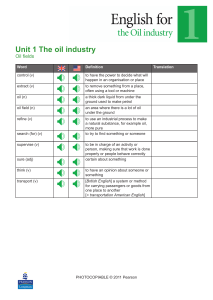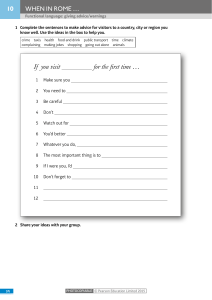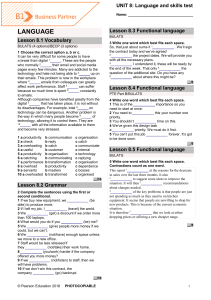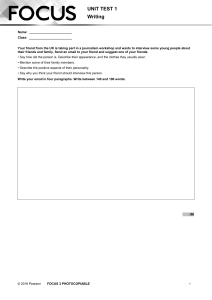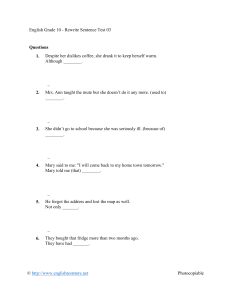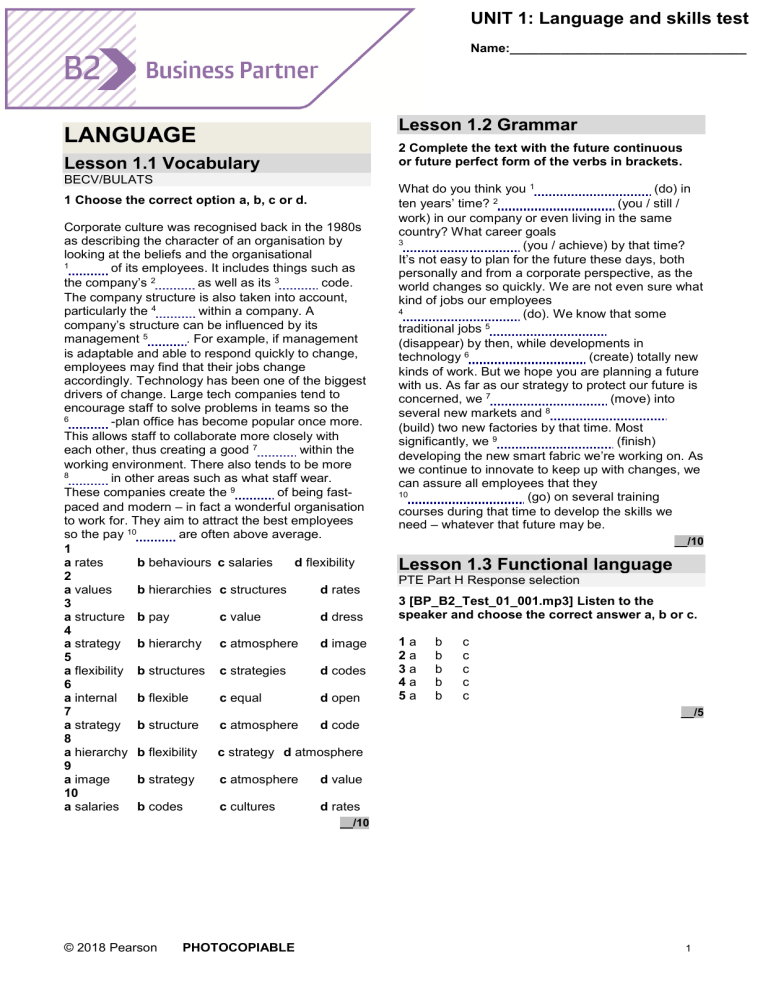
UNIT 1: Language and skills test Name:_________________________________ Lesson 1.2 Grammar LANGUAGE 2 Complete the text with the future continuous or future perfect form of the verbs in brackets. Lesson 1.1 Vocabulary BECV/BULATS 1 Choose the correct option a, b, c or d. Corporate culture was recognised back in the 1980s as describing the character of an organisation by looking at the beliefs and the organisational 1 of its employees. It includes things such as the company’s 2 as well as its 3 code. The company structure is also taken into account, particularly the 4 within a company. A company’s structure can be influenced by its management 5 . For example, if management is adaptable and able to respond quickly to change, employees may find that their jobs change accordingly. Technology has been one of the biggest drivers of change. Large tech companies tend to encourage staff to solve problems in teams so the 6 -plan office has become popular once more. This allows staff to collaborate more closely with each other, thus creating a good 7 within the working environment. There also tends to be more 8 in other areas such as what staff wear. These companies create the 9 of being fastpaced and modern – in fact a wonderful organisation to work for. They aim to attract the best employees so the pay 10 are often above average. 1 a rates b behaviours c salaries d flexibility 2 a values b hierarchies c structures d rates 3 a structure b pay c value d dress 4 a strategy b hierarchy c atmosphere d image 5 a flexibility b structures c strategies d codes 6 a internal b flexible c equal d open 7 a strategy b structure c atmosphere d code 8 a hierarchy b flexibility c strategy d atmosphere 9 a image b strategy c atmosphere d value 10 a salaries b codes c cultures d rates What do you think you 1 (do) in ten years’ time? 2 (you / still / work) in our company or even living in the same country? What career goals 3 (you / achieve) by that time? It’s not easy to plan for the future these days, both personally and from a corporate perspective, as the world changes so quickly. We are not even sure what kind of jobs our employees 4 (do). We know that some traditional jobs 5 (disappear) by then, while developments in technology 6 (create) totally new kinds of work. But we hope you are planning a future with us. As far as our strategy to protect our future is concerned, we 7 (move) into several new markets and 8 (build) two new factories by that time. Most significantly, we 9 (finish) developing the new smart fabric we’re working on. As we continue to innovate to keep up with changes, we can assure all employees that they 10 (go) on several training courses during that time to develop the skills we need – whatever that future may be. __/10 Lesson 1.3 Functional language PTE Part H Response selection 3 [BP_B2_Test_01_001.mp3] Listen to the speaker and choose the correct answer a, b or c. 1a 2a 3a 4a 5a b b b b b c c c c c __/5 __/10 © 2018 Pearson PHOTOCOPIABLE 1 UNIT 1: Language and skills test Name:_________________________________ Lesson 1.4 Functional language SKILLS BULATS 4 Complete the text with ONE word in each gap. Short listening BECV I’m Jan Peters. I have worked at the company as a Sales Director for the last three years and I’m 1 here in the Amsterdam office. I’m 2 for dealing with international orders. I used to work for a smaller company in New York where my 3 task was opening up new markets. I returned to the Netherlands when I got this job. This is one of the most dynamic organisations to work for and I’m very proud to be 4 . It’s 5 to be great working with everyone here. If you need my help in any way, just let me know. __/5 6 [BP_B2_Test_01_002.mp3] You will hear two telephone conversations. For each question, write one or two words or a number. Listening 1 TRAINING ENQUIRIES 1 from the German office called. Wants to know if he can do Level 2 of 2 course if he hasn’t done Level 1. He’s 3 at the time of Level 1. I suggested doing Level 1 in London in May, if his boss accepts 4 involved. Lesson 1.5 Functional language Listening 2 BECV 5 Some lines have an extra word and some lines are correct. If the line is correct, write CORRECT. If there is an extra word, write the word. 1 Want to spend on three months working in our 2 office in New York, Rome or Moscow? Then 3 you are sure to be delighted to learn about that 4 we are offering for you the chance to work in 5 one of our an other offices. All mid-level employees 6 who have been worked for us for more than a 7 year will be able to spend time in one of those 8 offices. Click on the link if for further information. 9 If you are interested in participating, please to 10 contact HR as soon as possible. 1 2 3 4 5 NOTES Phone call from Barney Day, RECRUSTOP. Concerned about our 5 process. Found out 6 about some faulty products. I reassured him that our 7 were not faulty and that a written 8 will be published. To send link to written apology. __/8 6 7 8 9 10 __/5 © 2018 Pearson PHOTOCOPIABLE 2 UNIT 1: Language and skills test Name:_________________________________ Reading BECV 7 Look at the statements below and the article sections about corporate culture. Which section (A–D) does each statement (1–5) refer to? You will need to use some of the letters more than once. 1 something to consider when applying for a job 2 the value of encouraging time away from work 3 the possibility of being dismissed from a job 4 a lack of promotion opportunities for staff 5 a hi-tech cause of staff demotivation 6 an example of an ineffective working environment 7 matching staff to the company culture 1 5 2 6 3 7 4 D Unfortunately, some companies have a culture of fear where staff are too worried about questioning anything for fear of losing their jobs. To most people it’s obvious that this would not lead to effective working practices. Sadly, the root of this fear comes from the top, the people who should be setting a positive example. If leaders behave in an unacceptable manner, it impacts on everyone within the organisation. Unnecessary anger or criticism from a leader will demotivate even the most optimistic and enthusiastic of staff. Writing BULATS 8 Your company wants to find out from its staff how they think their working environment can be improved. It was therefore decided to hold a competition for staff to suggest improvements. __/7 A Many companies are now offering their employees sabbaticals in an attempt to retain valuable staff. Due to highly-pressurised work environments and being constantly connected to work via technology, many staff are stressed and tired, leading to illness or dissatisfaction. Ensuring that staff have effective downtime is just as important as meeting work targets. Sabbaticals are one way of getting employees to stay with a company, but if they have to stay in a pressured environment for five years before they qualify for a sabbatical, then the effectiveness of a sabbatical can be extremely limited. Write an email to all staff: • explaining what you are planning to do and why. • saying how staff can get involved. • describing the prize for the best suggestion(s). and any other points which you think are important. Write 180–200 words. B One company thought the answer to retaining experienced staff was to introduce a sabbatical programme, but it was unsuccessful. The company offered excellent training for new mangers and engineers, but over 50 percent left once they had completed their training. Surprisingly, although salaries were not as competitive as those of rival companies, they were not the main issue. During staff exit interviews, they indicated that the main problem was that there were no clear career development paths. In fact, some older staff had been in the same position for twenty years. C Corporate culture is something that many potential employees do not pay enough attention to when researching a company. The corporate culture can make a company great to work for or a nightmare. Someone could have all the right qualifications, but might not fit into the work environment because the culture is alien to them. Management therefore needs to clarify exactly what kind of behaviour is expected of their staff and they need to ‘walk the talk’ themselves, i.e. they need to be models of that behaviour. © 2018 Pearson PHOTOCOPIABLE __/10 3
